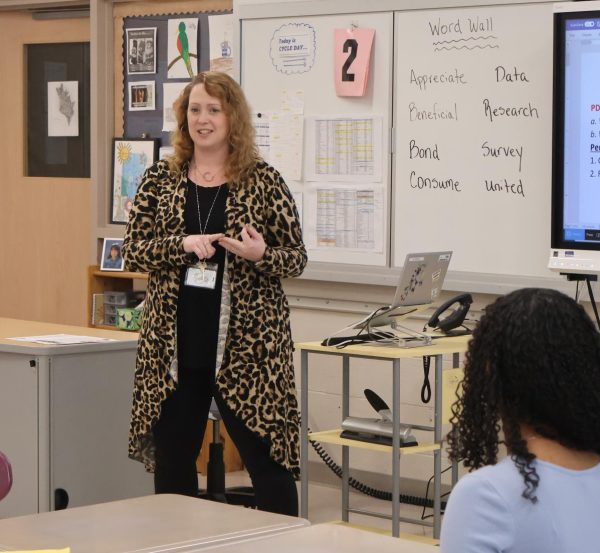Districts debate later start
Owen J. Roberts and schools across the country are considering later start times
December 15, 2022
Mia Lattanzio
Staff Writer
Students across the country are getting to hit the snooze button on their alarms a little later due to an increasing trend – later start times for high schools.
Neighboring Owen J. Roberts joined a growing list of school districts considering later start times for high schools beginning this fall. A community forum on the issue took place Oct. 6 to discuss the possibility of this change, and if a later start time is eventually approved, OJR would join a few other districts in the region to adopt a later start model.
According to an article in the Pottstown Mercury, the following three options were among those considered at an OJR community forum for the 2023-24 school year:
- Flipping start times for elementary and high school students.
- Staggering start times for elementary schools earlier and high schools later.
- Pushing all start times later.
Undoubtedly, sleep is a passionate issue among students.
“I feel like school should start later because I need sleep, I’m tired at school and can’t reach my full potential I have in my classes,” ninth-grader Avery Miller said. “I don’t work right now, but other kids do, so they can’t even just nap right when they get home.”
Phoenixville Area School District already moved start times back 30 minutes in 2019, and the Philadelphia School District recently decided on a 9 a.m. start time for the next school year at 51 of their high schools.
Spring-Ford does not appear to be joining those districts with a later beginning at this time, however, in 2019 the Pennsylvania State Senate approved a study that would observe how later start times would affect Pennsylvania’s students.
Superintendent Bob Rizzo stated that the district attended seminars, reviewed reports, and discussed the issue prior to the pandemic.
“In 2019, Spring-Ford administration attended some seminars on the topic of later school start times,” Rizzo explained. “We reviewed the Joint State Government Commission’s report on ‘Sleep Deprivation in Adolescents: The Case for Delaying Secondary School Start Times’ which is attached for your review. Additionally we reviewed some of the cited resources to develop a full understanding.
“While the Board and Administration were getting up to speed, the pandemic hit which halted our discussions. On October 24, 2019, we held a Town Hall meeting to discuss, among other things, school start times. During that meeting, we discussed the potential options discovered at that time.”
According to Rizzo, main considerations when weighing the possibility of an earlier start time include: how change would affect elementary and middle schools, the impact on the community and local industry, instructional hour requirements, meeting family needs, budgetary considerations, and student safety.
Some states outside of Pennsylvania are considering or have already taken action for later start times, such as in New Jersey where a statewide move to a later start time for high schools is being debated. Furthermore, this fall marks the first year in which all schools in California implemented start times no earlier than 8 a.m.
However, at Spring-Ford, Rizzo does not expect Pennsylvania to follow that path.
“Pennsylvania Department of Education promotes local autonomy to make decisions that best support individual communities,” Rizzo said. “I do not anticipate a state-wide mandate. I can say that a positive that came from the pandemic was more interaction between school districts so, as a community of educators, we do collaborate more than ever before.”
Flexibility for individual district needs is a major topic of discussion when considering state edicts, as there are many concerns with later start times.
“It would be a great idea to implement here, but sports and busing would be challenging,” Ninth-Grade Class President Mike Daiz remarked.
The average U.S. high school begins at 7:30 in the morning despite the American Academy of Pediatrics recommending that high schools should start around 8:30 as a result of studies that have proved that schools starting later will lead to improved test scores and less car accidents.
The early start times for school were first placed into motion in the 1980s in order to better cater to households where both parents leave for work. This situation was accommodating for parents who typically work 9 to 5, especially when it comes to children’s participation in after school activities. However, some studies have shown that this is not always the best option anymore, mainly because many parents and guardians are now able to work from home, allowing for the new possibility for flexibility in regards to later start times.
While it may seem like a beneficial route to take, later start times will cause large inconveniences for parents without flexible work schedules. Elementary school parents who have their high school aged children watch younger siblings will be at a loss for childcare. This can be a problem with only one expensive solution, as parents would need to pay for childcare they may not be able to afford. Moreover, issues would occur when scheduling athletic events because school districts that have different start and end times for games will find it difficult to schedule game times that would work for both participating teams.
Yet the upsides are more plentiful than the downsides since schools with later start times are shown to have increased graduation rates as well as better grades and less absences. According to the U.S. News and World Report, the later start time also added 0.1 points to students’ GPA.
Ninth-grader Zainab Sabir feels that the boosted 0.1 point is just another reason to start schools later. “Imagine you need a 4.0 GPA to get into your dream college, Harvard, but you have a 3.9. GPA. 0.1 added to your GPA can make a huge impact on your future.”
The Journal of Clinical Sleep Medicine out of Fairfax County Schools in Virginia noted that when schools begin later, fewer early-morning car crashes occurred due to drivers arriving on school campuses later than the typical “rush hour,” because the later start time means that there are less vehicles on the road and less congestion around school campuses.
Later start times could also provide more sleep and better production.
“I am tired and unmotivated all day at school because I do not get enough sleep,” Natalie Fuller said. “If school started later, then I would have more time to rest in the morning which would lead to a more productive school day.”







